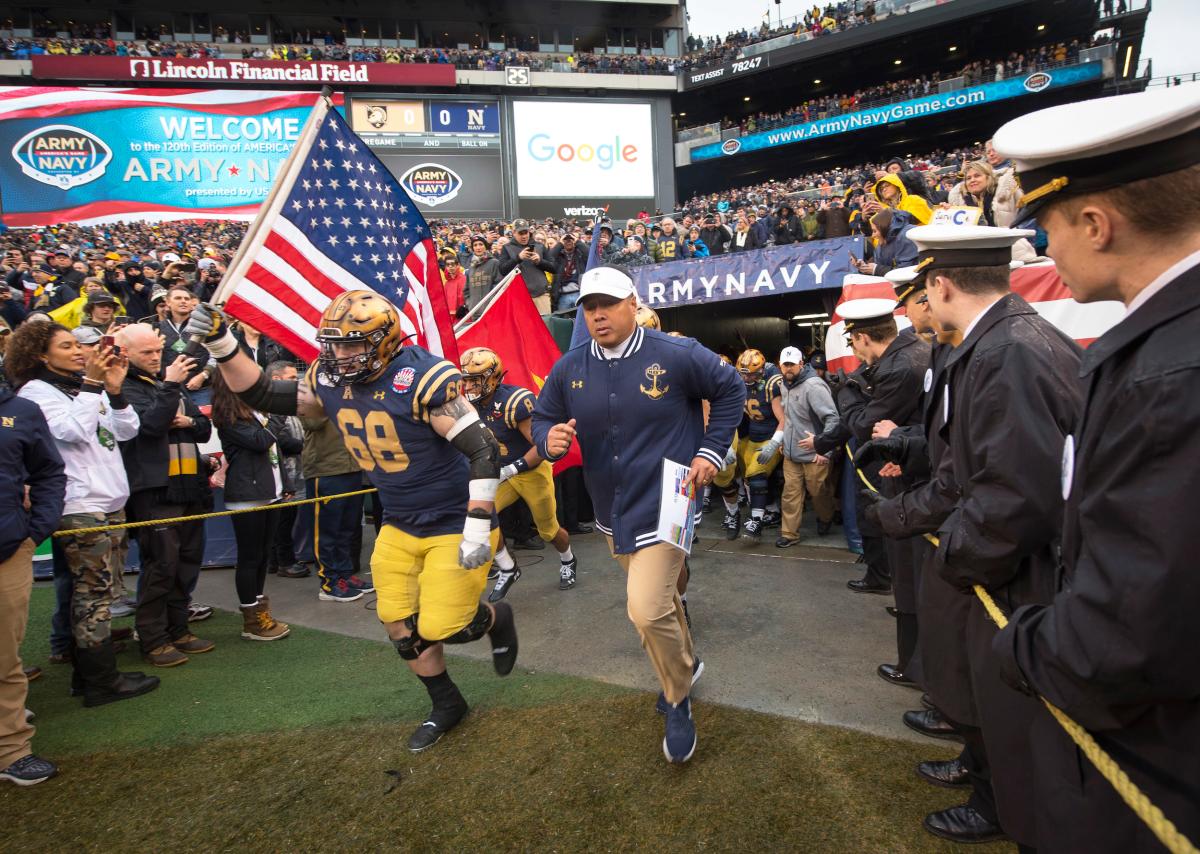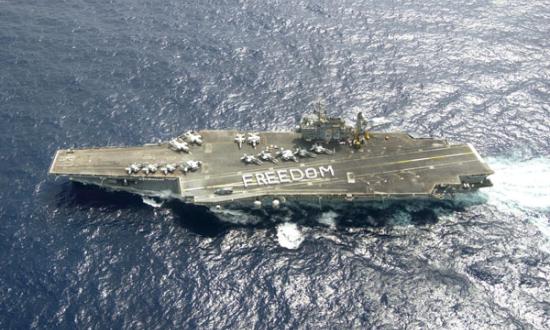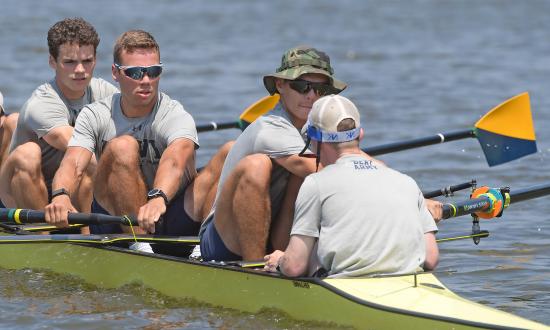Following the Navy football team’s double overtime loss to Army on 10 December, the U.S. Naval Academy Athletic Director fired Coach Ken Niumatalolo before he even left the stadium in Philadelphia to return to Annapolis. The firing, and the way it was done to the winningest coach in Navy football history after 15 years in the job, ignited a firestorm of criticism from many fans, former midshipmen, and former Navy football players. To some, it seemed contrary to core leadership tenets taught at and cherished by the Naval Academy.
At a Sunday press conference, the Athletic Director said the decision was not impulsive but had been informed by several years of underperformance. “This didn't come down to a fumble, or even a lost game on Saturday,” he said. “These goals and expectations have been set for years. . . I think about our corporate relationships. I think about our television exposures. I think about our responsibility to the conference, our alumni.”
I played four years of football at the Academy. Three years on the scout team, running plays simulating the upcoming team and taking hits for the defense so they might be better prepared for Saturday. I was grinding out a reason to be there, with only my senior year on varsity special teams. I was not playing for Alabama or Ohio State or USC. I was no star and was never going pro. To have it explained to me, as one of those alumni that are “thought about,” that Ken Niumatalolo should not coach at the Naval Academy anymore because of the need to secure future corporate sponsorships, television money, and be a responsible member of the American Athletic Conference, appears fundamentally misaligned with the missions and priorities of the Academy and primary commissioning source for the U.S. Navy and Marine Corps.
I was raised in Georgia as a college football fan before ever attending the Naval Academy. I have watched with interest, fascination, and some cynicism as conferences realigned, the transfer portal opened yearly, and players began to profit from their name, image, and likeness (NIL). Today, as ever, college football is a big business. Yet, the Naval Academy football team cannot acquire players through the transfer portal and Navy players cannot earn NIL revenue. Given these realities at the Naval Academy, maybe I was naive in thinking that sports like football are important and continue to exist primarily supporting a singular mission:
To develop Midshipmen morally, mentally, and physically and to imbue them with the highest ideals of duty, honor and loyalty in order to graduate leaders who are dedicated to a career of naval service and have potential for future development in mind and character to assume the highest responsibilities of command, citizenship and government.
Well before Ken was fired, I readily shared that I learned far more about leadership, perseverance, and teamwork from him as the coach, and from my time on the scout team, than I ever did through a formal leadership curriculum, all of which I have applied as a surface warfare officer in the nearly eight years since I commissioned. Coach Niumatalolo taught his players many things, but perhaps the most important leadership lessons that have guided me as a surface warfare officer are these:
- “It is HARD to win,” and “We can do everything right, and that'll only give us a chance." The former is a constant mantra, and the latter is true in everyday life or war. The more I know about what makes a ship succeed or fail, materially or tactically, the more I realize that I can do everything right as a leader or manager and that will only give my team a chance as circumstances change or we are faced with obstacles that seem far greater than we can imagine. Further, accepting this daily reality ensures we will never be comfortable with success when we win, while also reinforcing the standard that we have to do everything right because if we do not, we have even less of a chance to succeed in the first place.
- No excuses. Coach Ken often yelled “nobody cares!” during practices or the toughest workouts. As he explained it, no matter the challenges with academics, military obligations, or that day’s football practice, you cannot expect anyone outside the team to feel bad for you or cut you any slack. Do not feel sorry for yourself because of the strain. Accept that sometimes life is just hard, and you need your team as the ones who do understand and do care. While I have never yelled “Nobody cares!” at my sailors, more times than I can count at quarters I have openly said, “Yes, this is going to be hard. Control what you can control and do your job,” which is a more ship-appropriate way to say exactly what Coach Ken meant. And should war come, I am confident the enemy will not care either.
- “Everyone deserves dignity.” More a lesson lived than stated, but Coach Ken is one of the few people I know who I sincerely believe would be the same, genuine person to his secretary as he would be to the President of the United States (several of whom he met because of Commander-in-Chief trophy ceremonies). He relayed a personal story in print before, that his dad was a restaurant manager who knew the names of all the cooks, bakers, waiters, etc., and how Ken took that into his role and responsibilities as a football coach. So many times he brought up in front of the team people who were doing the dirty work and little details of making the team successful to thank them publicly. We would watch him talk to anyone that worked in Ricketts Hall as if they were as important as any other player. I still have a note written in a small wheelbook from my first division officer tour that says, “Remember All 166.” That line refers to when I was a plebe, tucked away in a random locker after practice, still trying to manage life at the Academy and all the things every plebe has ever dealt with while feeling bad for myself for being on the scout team. And one day after practice Ken walked past my locker and called me by my first name, asked how I was doing, wanted more than “Fine, Coach,” asked me how my parents were doing, and remembered all those names and details, despite there being 166 players on the team, many of whose names I could not even remember—and I was just a plebe who definitely thought I did not matter. As I continue my career at sea, when it comes to how to take care of sailors, I try to follow Coach Niumatalolo’s example.
As these lessons make clear, Coach Niumatolo means a lot to me and many others. It meant all the more in 2015 when he was offered the Brigham Young University head coaching job, with the opportunity to coach his two sons and be a community leader in the Mormon church, and he chose to stay at Navy. Some have rushed to condemn the Athletic Director for firing Coach Niumatalolo, while there are surely others who celebrate a bold decision to seek better on-field results in a rapidly changing college football environment. If he needed to be dismissed, I believe the winningest coach in Navy football history deserved the dignity of not being fired in the immediate wake of the first overtime game and loss in Army-Navy history. As for the decision as a whole, I have neither the appropriate vantage point nor experience in athletics administration to judge. However, the comments of the Athletic Director left me with the perception, which I hope is not reality, that he needed to fire Coach Niumatalolo based primarily on financial motives and a desire to maintain Navy football’s station in the NCAA Division 1 landscape.
Every choice is hard, and I will choose to see this choice in the light of the last lesson I learned from Coach Niumatalolo, both in how he has lived his life and how he repeated it to his team. Everyone is accountable for their choices, no matter the challenges or circumstances, and the legacies we leave at home, at work, and in our communities are neither separate nor distinct. When Coach Niumatalolo told us that he loved us and wanted to make us better, it was true—but only after guaranteeing and demonstrating his love for God, his wife, and his family. That is a legacy I am sure he is proud to leave, and a lesson we must all consider from our time at the Naval Academy and in the future.
Future Academy graduates will face supreme personal and professional challenges in peace and war. If Navy football needs to win primarily for television money or corporate sponsorships, then I am not interested in winning. To his credit, Ken never wavered from the fundamental focus that we were midshipmen and people first, and that he wanted us to be better men, spouses, and leaders in the Navy and Marine Corps through his role as a coach. I am a better officer, spouse, and man because of Ken Niumatalolo. The next Navy football coach, former defensive coordinator Brian Newberry, must endeavor to win games on the field, yes, but not before ensuring the Academy’s football-playing graduates are morally, mentally, and physically ready to meet the challenges of a demanding future. Anything less would be unbecoming of the Navy, Marine Corps, and the Academy that they represent. Our world is too dangerous for our focus to be otherwise.






